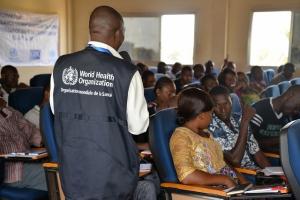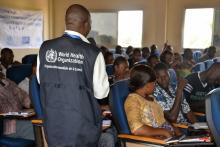WHO trains 250 community surveillance workers for Ebola response
In a new initiative by WHO in partnership with UNICEF, CDC, Coordination Nationale de Lutte Contre Ebola, MSF and IFRC, 250 community surveillance workers are being trained to ramp up the Ebola response in its final stages. WHO and partners in Guinea recognize the need for increased vigilance as Ebola cases remain low and the end of the epidemic is in sight.
Over the past year, as the Ebola response unfolded, surveillance teams were faced with reticence and lack of cooperation from communities in Conakry. The population were scared and rumours developed and circulated frequently. This slowed down the pace of investigations, identification and monitoring of contacts, and active case finding. The goal of this initiative is to train local community members from each of the five communes in Conakry to open dialogues with the families in their areas and develop community participation. These community surveillance workers will cooperate closely with monitoring teams to improve the current Ebola response and future responses.
“Based on discussions in technical meetings, missions in-country and a situation analysis, in December 2014 and January 2015, a strategic vision was developed to strengthen social mobilization for systematic and sustained community engagement in the five communes of Conakry, as well as six key prefectures,” explained Mr Paryss Kouta, WHO Social Mobilization and Community Engagement Coordinator. “The 250 community surveillance workers who we have brought on board, are some of the key strategic allies identified to support WHO’s work in the area of community based surveillance. This is a unique initiative in Guinea.”
The training sessions, each with 50 participants, took place in the five communes of Conakry: Kaloum, Matam, Ratoma, Dixin and Matoto. This comprehensive training was led by WHO facilitators and trainers from each of the aforementioned partner organizations. The sessions looked at the current epidemiological situation, emergency health overview, the role of community surveillance workers, interpersonal communication skills and cultural considerations such as burial practices. The sessions consisted of pre and post-tests, theoretical sessions and role plays.
The goal of the teams will be to pave the way for WHO response teams by creating the right conditions for access to families and contacts, to participate in interactions with communities and to continue awareness raising activities after the teams leave. They will be accompanied by 25 supervisors, who will be engaged to ensure the proper conduct of field interventions. A further training session will be held to equip the supervisors with the tools to monitor and guide the community surveillance teams. Supervisors will take part in the daily coordination meetings, daily debriefings and weekly meetings of communication and social mobilization in every municipality.
“These training sessions are seen as real examples of strong collaboration between UN agencies as well as international NGOs. UNICEF choose to be involved in this promising initiative as it is expected to greatly improve surveillance in Conakry, especially contact tracing,” said Mr Antoine Saka Saka, UNICEF Communication for Development Officer.
Complementing WHO programs already in place as part of the response to the Ebola epidemic, this initiative is seen as an opportunity to strengthen the ties between monitoring and community participation. Going forward it will encourage a multi-sectoral approach to the response that integrates the components of monitoring and community participation to improve cooperation with local families.
_________________________________________________
For more information, please contact:
Pippa Haughton, Communications Officer WHO Guinea
Mobile: +224 624 980 069
Email: haughtonp [at] who.int (haughtonp[at]who[dot]int)




